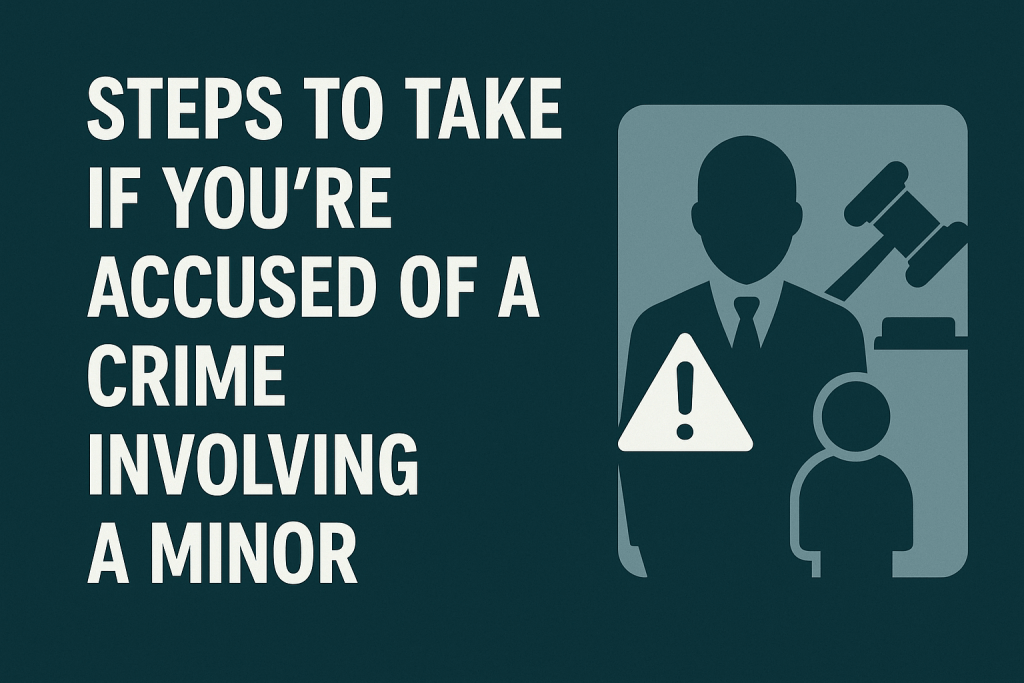Few accusations carry as much weight, or as devastating potential consequences, as being accused of a crime involving a minor. Whether the allegation is completely false, exaggerated, or the result of a misunderstanding, the situation is serious and can impact your freedom, reputation, and future.
Emotions run high in these cases, and even an unproven accusation can cause lasting damage. That’s why it’s crucial to remain calm and understand the steps to protect yourself if you were accused. Here’s what to do immediately if you’re facing such allegations.

Say Nothing Until You Are Legally Protected
Are you thinking that if you could just explain your side, it would clear everything up? It’s human nature to want to defend yourself and to want to get the facts out there, especially when you are being falsely accused. Your instinct tells you that the best way to help people understand what really happened is to talk about it. While it is understandable to want to talk things out, it may also be extremely dangerous.
Talking to law enforcement, investigators, or anyone else before you have a lawyer present can be detrimental to your case. Remember, law enforcement aren’t your saviors trying to prove your innocence. They are collecting evidence, and taking notes, unlike your advocacy and advocacy efforts, their words and notes will be scrutinized for evidence that can be utilized against you.
Even statements that you believe are harmless can be taken the wrong way or totally taken out of context. A simple statement regarding your relationship with the child, or whereabouts during certain timeframes can be twisted into something that sounds suspicious. What may sound like clarification to you may sound like an admission to the prosecutor.
So, politely exercise your right to silence and demand an attorney right away. This is not a guilty thing to do, it is a protection from a system that intends to build cases and not prove innocence.
Find the Right Advocate
Isn’t it easy to think, “I could just hire on any criminal lawyer and leave it up to them to run with it?” That may work in some cases. However, in cases involving minors NOT all criminal lawyers are effective at handling the allegations. These cases may require a level of knowledge and expertise, a deep understanding of child psychology, and experience dealing with the intricacies of these situations.
Effective representation by a qualified attorney will allow you to know where you are in the investigation, what rights you have, and begin constructing a defense as soon as possible. They know how prosecutors think about these cases, which evidence is the biggest piece, and how they can challenge the suspect’s credibility or the methods of investigation.
In cases like these, time is of the essence. Evidence needs to be preserved, witnesses may need to be contacted immediately, and there are usually eggshells to walk around for various legal motions. The longer you wait to take action the more weakened your defense can become.
Look for someone with a track record of working on these sensitive cases. Ask about their experiences with cases involving accused minors, their success rate, their feelings toward these emotionally charged cases, how they think about these cases strategically, and anything else that seems important. The right attorney will make a big difference between devastating consequences and the hope of protecting your future.
Do Not Attempt To Contact Anyone Involved.
Has there ever been a time during the investigation that you thought maybe it could help your case by reaching out to clear the air? The instant you attempt to speak with the child, their family or your mutual contacts concerning the case, your case and your future could come to an abrupt end. What you think is friendly communication may be perceived very differently by others and ultimately the criminal justice system.
It is possible this type of communication could be seen as intimidation, harassment or obstruction of justice. Furthermore, even the most simplistic attempt to reach out, like “I am sorry I texted you when I was angry, what happened” could be perceived as an attempt to influence the information or muzzle the accuser. The prosecutor will use any contact against you as evidence of consciousness of guilt.
Prosecutors generally and automatically obtain protective or no-contact orders through the courts in a case like this. If you communicate with the other party, you may be asking for a new chunk of criminal charges that only makes your case worse. These orders generally are considered restrictions to contact, third parties to contact, and possibly being in the same location as the alleged victim.
Allow your attorney to do the communicating and traverse these uncomfortable boundaries. Your attorney is experienced in obtaining necessary information lawfully while protecting your interest. Your attorney also can advise you on ways to avoid inadvertent contact and what steps to take if you encounter the alleged victim or family member of the alleged victim in unexpected circumstances.
Protect and Preserve Your Evidence
What if the key to your defense is sitting in your phone or computer right now? Make notes of people that can verify your position or character. Think about who might have shared the event with you, who can speak of your character, and who possesses relevant information regarding the situation.
Capture text messages, emails, social media posts, or any other documents that will support your position. A screenshot of conversations, photos which indicate a timestamp, and communications which could shed insight into your relationship with the alleged victim or family member, should be gathered as potential evidence.
Please do not delete anything, especially if you feel it looks bad. Even if you delete evidence it is consciousness of guilt, and experts in computer forensics, a large amount of deleted files can be recovered. What looks harmful to you may be helpful when viewed in the correct context by your attorney.
Give your attorney all of the relevant information, to come up with the best legal strategy. Your attorney can assist in understanding the most relevant evidence, preserving it properly, and identifying what additional evidence may be required to defend you.
Protect Your Future by Acting Smart
Being accused of a criminal offense involving a minor is one of the most serious issues anyone can find themselves in, and that can fundamentally affect your life.
Fear and panic are normal and understandable reactions. However, the best defense starts with saying nothing, seeking the right lawyers, and not doing anything that would make the circumstances worse.
Hopefully, with the right action and the guidance of an experienced lawyer, you can protect your rights and start the process of getting to the best possible position.
